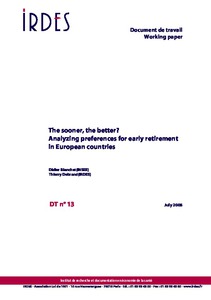The sooner, the better? Analyzing preferences for early retirement in European countries

Blanchet, Didier ; Debrand, Thierry
Institut de recherche et documentation en économie de la santé, Paris
IRDES - Paris
2008
25 p.
comparison ; early retirement ; retirement age ; statistics
Document de travail - Working paper
13
Social protection - Old age benefits
English
Bibliogr.
"Individual preferences concerning retirement age are strongly differentiated both within and between countries. According to the Share survey, the proportion of workers aged from 50 to 65 who wished to retire as soon as possible in 2004 ranged from 31% in the Netherlands to 67% in Spain. Such a preference for early retirement can depend on both financial and non financial factors. Non financial factors include working conditions, health status and mortality expectations. Economic or “monetary” factors essentially correspond to the magnitude of pension entitlements and how they depend upon retirement age. Entitlements that depend positively on retirement age should reduce the motivation to retire as soon as possible.
This paper compares the role of these different factors by combining individual data from the Share survey with macroeconomic indicators of pension entitlements recently produced by the OECD. Health and work conditions come out as strong determinants of the preference for early retirement. Being generally satisfied with one's work leads to a drop of approximately 16 percentage points in the probability of wishing to retire as soon as possible. Declaring oneself in bad or very bad health has a positive effect on this probability of a comparable order of magnitude. However, these non financial factors do not significantly contribute to the explanation of cross-country differentials. Conversely, financial factors seem to have a lower impact at micro-level, but a higher one for the explanation of cross-country differentials."
Digital
The ETUI is co-funded by the European Union. Views and opinions expressed are however those of the author(s) only and do not necessarily reflect those of the European Union or the ETUI.